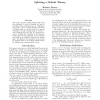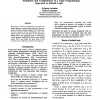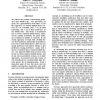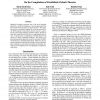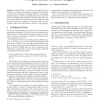168
click to vote
JELIA
2010
Springer
15 years 14 days ago
2010
Springer
In this paper, we show that Reiter’s default logic in the propositional case can be translated into answer set programming by identifying the internal relationships among formula...
119
click to vote
JANCL
2002
15 years 1 months ago
2002
Consistency-based approaches in nonmonotonic reasoning may be expected to yield multiple sets of default conclusions for a given default theory. Reasoning about such extensions is ...
121
click to vote
CI
2004
15 years 1 months ago
2004
We present a general approach for representing and reasoning with sets of defaults in default logic, focussing on reasoning about preferences among sets of defaults. First, we con...
133
click to vote
CI
2004
15 years 1 months ago
2004
This paper shows how action theories, expressed in an extended version of the language B, can be naturally encoded using Prioritized Default Theory. We also show how prioritized d...
153
click to vote
AAAI
1996
15 years 3 months ago
1996
This paper presents mathematical results that can sometimes be used to simplify the task of reasoning about a default theory, by \splitting it into parts." These so-called Sp...
117
click to vote
AAAI
1994
15 years 3 months ago
1994
We present a method of representing some classes of default theories as normal logic programs. The main point is that the standard semantics (i.e. SLDNF-resolution) computes answe...
138
click to vote
IJCAI
1997
15 years 3 months ago
1997
We address the problem of introducing preferences into default logic. Two approaches are given, one a generalisation of the other. In the first approach, an ordered default theory...
120
click to vote
FLAIRS
2008
15 years 4 months ago
2008
Handling exceptions represents one of the most important problems in Artificial Intelligence. Several approaches have been proposed for reasoning on default theories. This paper f...
136
click to vote
AAAI
2007
15 years 4 months ago
2007
Generality or refinement relations between different theories have important applications to generalization in inductive logic programming, refinement of ontologies, and coordin...
112
click to vote
ECAI
1998
Springer
15 years 6 months ago
1998
Springer
Abstract. Default logic is one of the most widely used formalisms to formalize commonsense reasoning. In this paper we analyze the complexity of deciding whether a propositional in...

